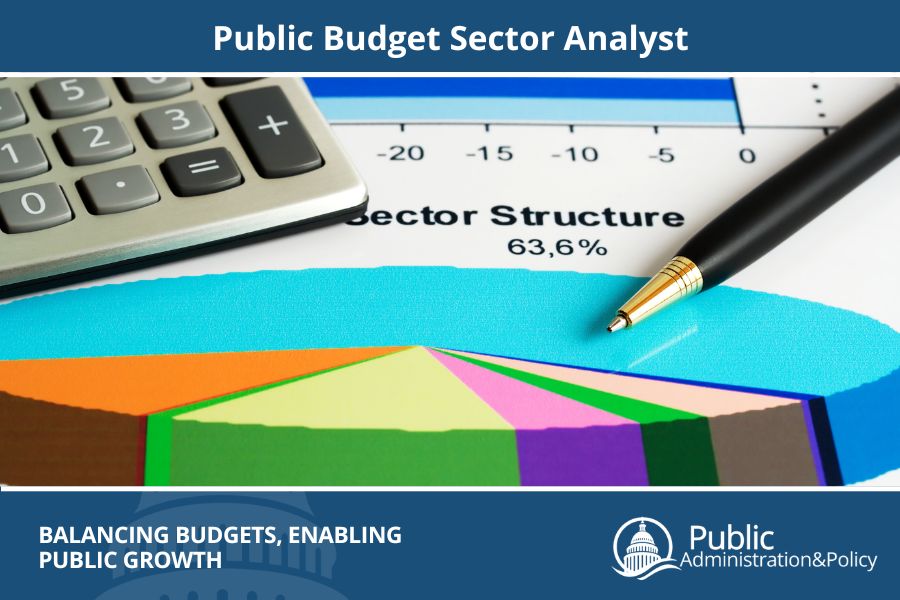How to Become a Public Budget Sector Analyst
Analyze, Plan, and Optimize Budgets to Support Public Growth and Economic Stability
Public Budget Sector Analysts are the financial stewards behind successful public and private sector operations. They are crucial in ensuring financial resources are allocated and utilized effectively to achieve organizational goals and support community development. These professionals are integral to maintaining fiscal responsibility and promoting economic stability, from evaluating budgets and forecasting expenditures to monitoring spending and identifying cost-saving opportunities.
Beyond their technical expertise, Public Budget Sector Analysts often collaborate with leaders and policymakers to provide insights that inform critical decisions. They analyze data, develop financial strategies, and ensure compliance with regulations while balancing the needs of various stakeholders. Their work helps organizations operate efficiently and contributes to public trust and accountability in managing resources.

Table of Contents
What Is a Public Budget Sector Analyst?
A Public Budget Sector Analyst evaluates and monitors the financial performance of public and private organizations. They analyze budgets, assess resource allocation, and ensure fiscal accountability to support operational success.
Key Job Duties
- Budget Development: Assist in creating and implementing budgets for public programs.
- Expenditure Monitoring: Track and monitor spending to ensure compliance with financial guidelines.
- Cost Analysis: Identify areas for cost savings and improve resource allocation.
- Financial Reporting: Prepare detailed budget reports on economic performance for stakeholders.
- Policy Advising: Recommend fiscal strategies to elected officials and agency leaders.
Budget Analysts are crucial in state and local governments, federal agencies, and nonprofit organizations. They ensure that financial resources are allocated effectively to meet organizational goals.
“Public service must be more than doing a job efficiently and honestly. It must be a complete dedication to the people and to the nation.”
— Margaret Chase Smith, U.S. Senator and Advocate for Public Service
Step 1: Complete Your Degree
A degree in Public Administration, Business Administration, or a related field is essential for aspiring Public Budget Sector Analysts. These programs provide foundational budgeting, policy analysis, and organizational management knowledge.
Best Degrees for Public Budget Sector Analysts
- Bachelor of Public Administration: Focuses on governance, public finance, and resource management.
- Master of Public Administration (MPA): Offers advanced training in budgeting, leadership, and policy implementation.
- Master of Business Administration (MBA): Provides a strong focus on financial management and strategic planning.
- Ph.D. in Public Administration: Prepares individuals for academic or senior research roles in public budgeting.
Why Online Degrees Can Help
Online programs in Public Administration and Business Administration offer flexibility for working professionals. Many universities in the United States provide online options tailored to those balancing education with career responsibilities.
Explore Degree Options:
Step 2: Learn About Public Budget Sector Analyst Salaries
Public Budget Sector Analysts earn competitive annual salaries that reflect their expertise in financial management. According to the Bureau of Labor Statistics (BLS), the median salary for budget analysts is $79,940 per year, with opportunities for growth based on education and work experience.
Salary Range by Experience
- Entry-Level Analysts: $50,000–$65,000 annually.
- Mid-Career Analysts: $70,000–$90,000 annually.
- Senior Analysts or Managers: $100,000+ annually.
Factors Influencing Salary
- Education Level: Analysts with advanced degrees, such as an MPA or MBA, often earn higher salaries.
- Work Experience: Analysts with extensive experience in financial reporting and analysis command higher pay.
- Sector: Federal government and consulting roles typically pay more than local government positions.
Visit the Bureau of Labor Statistics (BLS) for additional salary insights and trends.
Step 3: Build Financial and Analytical Skills
Public Budget Sector Analysts require technical, analytical, and communication skills to excel in their roles.
Key Skills for Public Budget Sector Analysts
- Financial Analysis: Evaluate budgets and identify trends to guide decision-making.
- Strategic Planning: Develop long-term financial strategies for public programs.
- Data Analysis: Use statistical tools to assess expenditures and forecast budgetary needs.
- Communication: Present findings to stakeholders, including elected officials and agency leaders.
- Policy Knowledge: Understand regulations and policies governing public funds.
Certifications to Enhance Your Career
- Certified Government Financial Manager (CGFM): Recognized credential for public finance professionals.
- Chartered Financial Analyst (CFA): Advanced certification for financial management and analysis.
Engage in workshops and seminars offered by organizations like the Association of Government Accountants (AGA) to refine your skills.
Step 4: Find a Public Budget Sector Analyst Job
Public Budget Sector Analyst jobs are available across various industries, offering opportunities to impact public financial management.
Industries That Hire Public Budget Sector Analysts
- State and Local Governments: Manage budgets for education, transportation, and public safety programs.
- Federal Government: Oversee large-scale budgeting for national programs.
- Nonprofit Organizations: Ensure fiscal accountability for community-focused initiatives.
- Consulting Firms: Advise public sector clients on financial strategies.
Notable Employers
- U.S. Department of the Treasury
- Government Finance Officers Association (GFOA)
- National Association of State Budget Officers (NASBO)
Job boards like USAJobs and Idealist provide excellent resources for finding budget analyst jobs.
Career Opportunities in Public Budgeting
A career as a Public Budget Sector Analyst offers pathways to senior roles in public finance and policy advising. Some popular opportunities include:
- Budget Director: Leading financial planning for government agencies.
- Policy Advisor: Providing fiscal recommendations to policymakers.
- Program Manager: Overseeing budget implementation for public initiatives.
- Financial Consultant: Advising organizations on cost optimization strategies.
Prominent organizations, such as the National League of Cities and the Association for Budgeting and Financial Management (ABFM), provide resources for career advancement.
Sources
- Bureau of Labor Statistics (BLS). “Budget Analysts.” https://www.bls.gov
- Association of Government Accountants (AGA). “Professional Development Resources.” https://www.agacgfm.org
- Government Finance Officers Association (GFOA). “Resources for Public Finance Professionals.” https://www.gfoa.org
- Payscale. “Budget Analyst Salary Overview.” https://www.payscale.com
Acknowledgments
Insights from government agencies, nonprofit organizations, and academic institutions inform this content—special thanks to public finance professionals for their contributions to advancing fiscal accountability and strategic budgeting.
